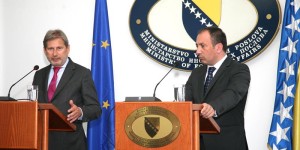Written by: Peter Sorensen, Head of the EU Delegation/EUSR in Bosnia and Herzegovina and Boris Kelečević, Head of the ICRC Delegation
One of the tragedies of conflict is that many people go missing, causing anguish and uncertainty for their families and friends. People have the right to know what happened to their missing relatives. Governments, the military authorities and armed groups have an obligation afterwards to provide information and assist in efforts to put families back together.
International humanitarian law and human rights law require parties to a conflict to take measures in the first place to ensure that people do not go missing. If they do, the parties are required to take all possible measures to ensure their fate is known and their families informed.
In Bosnia and Herzegovina, the missing persons issue is extremely complex and has a deep impact, beyond the families directly affected. The torment is equally felt in the society and entire communities of those who went missing.
The emotional recovery of Bosnia and Herzegovina has been heavily burdened by the lack of resolution of the destinies of thousands of missing persons. This has had very severe consequences over the past 18 years. Despite the significant efforts that have been made in addressing the issue of the missing and the progress in locating and identifying missing persons since the end of the war, many families remain without information about the fate and whereabouts of their missing relatives.
Over the past several years, a decline in number of exhumed human remains indicates a lack of new information on location of the gravesites, causing concern for many families about whether they will ever be able to receive answers for which they have been waiting so long. The prime responsibility to account for missing persons rests clearly with the authorities of Bosnia and Herzegovina. According to both the Dayton Peace Agreement and the BiH Law on Missing Persons, the authorities must provide information on the fate and whereabouts of missing persons.
It remains a key priority for our organisations that the authorities of Bosnia and Herzegovina demonstrate clear political will on this subject, enhance their involvement and provide information that would lead to gravesite locations. The authorities also must address the forensic challenge of identifying already exhumed human remains, stored in facilities across the country. It is equally important that the state and entities authorities enable the implementation of the provisions of the Law on Missing Persons related to the pending establishment of the fund aimed at financially supporting the families. Also, in order to provide a countrywide legal framework for addressing the needs of the families of the missing without discrimination, the relevant state and entity legislation should be harmonized.
The Missing Persons’ Institute (MPI) – the national institution tasked with pursuing cases of missing persons regardless of their ethnicity, religion or gender – should enjoy trust and strong backing from all relevant institutions. The authorities must allocate sufficient resources to the MPI and prevent attempts of politicisation of its work as well as of the process of tracing the missing in general. Clarifying the fate and whereabouts of missing persons is primarily humanitarian issue and it must not be subject to political antagonism.
The establishment of the Central Records on Missing Persons (CEN) within the MPI is a very important step in the process of tracing the missing. A single and verified official list of missing persons would facilitate the efforts in solving cases and reduce space for any manipulation of figures of missing persons. Although lately some positive developments were made in the verification of data related to cases of persons still unaccounted for, it is crucial for the MPI to make further efforts in this field.
Following the cessation of conflicts in the former Yugoslavia, there were 40,000 persons missing and presumed dead. This number includes the conflicts in Croatia, Bosnia and Herzegovina, and Kosovo* as well as the 2001 crisis in Former Yugoslav Republic of Macedonia (FYRoM). Of that number, almost 3/4 were missing from the BiH conflict.
Today, when we mark the International Day of Disappeared, it is a moment to look back and acknowledge the important work and evolution of the search for missing persons that brought closure to so many families. Equally important, it is a moment to point out that families of around nine thousand missing persons in Bosnia and Herzegovina still await answers and we all must do everything in our power to ensure that they do not feel forgotten and let down.
Responding to this important issue, the international community has been providing support from the very beginning. The ICRC focused its activities to secure the cooperation of governments and other authorities in locating and identifying missing persons and supporting their families. The EU has allocated five million Euro so far in support to finding missing persons in Bosnia and Herzegovina. The support will continue, and should in the long terms be replaced by full ownership of the national authorities.
There are many priorities ahead of Bosnia and Herzegovina, towards stability and prosperity. To embrace the future means to overcome the tragic past. The clarification of the fate of missing persons, with its deep human and emotional character, must remain among the first priorities. Let us not make families of missing persons wait any longer.
*This designation is without prejudice to positions on status, and is in line with UNSC 1244 and the ICJ Opinion on the Kosovo Declaration of Independence.




